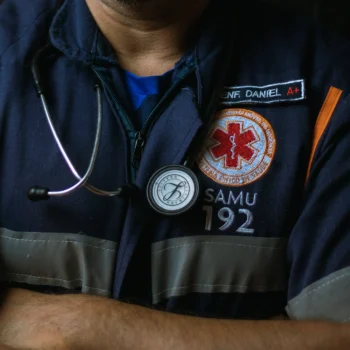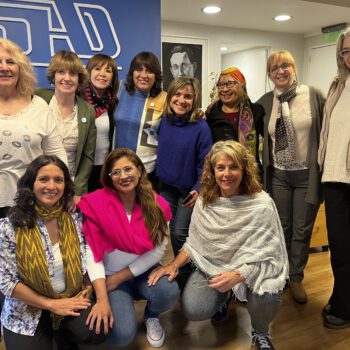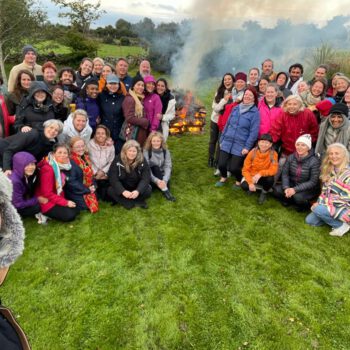Rhonda Nelson is a registered professional counselor, clinical supervisor and plant medicine integration specialist. She’s also a Compassionate Inquiry® founding facilitator, which means she was part of the core group who took the therapeutic approach originally named, “Gabor-style” and shaped it into what is known today as Compassionate InquiryⓇ.
This post references a short excerpt of Rhonda’s story of transformation and healing through Compassionate InquiryⓇ. Listen to her full interview on The Gifts of Trauma Podcast.

Photo Credit: Stockcake
Introduction:
Rhonda’s transformative journey is a powerful testament to both the power of self-discovery and the healing potential that lies within each of us. It’s a compelling reminder that by confronting our fears, embracing self-compassion and seeking support, we can unlock our true nature and live authentically.
Guided by the teachings of Dr. Gabor Maté, Rhonda embarked on a profound exploration of her inner self, uncovering the root causes of her emotional pain and the coping mechanisms she had developed to deal with it. Through this courageous process, Rhonda realized that true transformation begins with self-recognition. This awareness enabled her to explore her diagnosis of CMS, an incurable neuro- muscular disorder, and confront the intense fear that had been running her life. With curiosity and non-judgment she unveiled the origins of her emotional barriers, deep-seated beliefs, stories and memories. This exploration ultimately facilitated her emotional healing and transformed her life.
– – –
“I had this ability to drop the cane when I was around my family… [to] make this disability invisible.” – Rhonda Nelson
Rhonda’s journey with Compassionate Inquiry began in 2014 when she discovered the work of Dr. Gabor Maté and attended his one-day workshop on Addiction. Her intention for attending was to enhance her work as an addictions counselor, and while it profoundly informed her professionally,
she learned that its benefits were much more personal.
At one point, Gabor shared a personal story to illustrate implicit memory (how the body speaks for us). He spoke of a time when, on the day of foot surgery, due to a running injury, he went to visit his mom who was an in-patient at the same hospital. He limped down the hallway to her room and upon entering the room his limp disappeared. When their visit concluded, he walked to the door again with no limp, and upon exiting the room his limp returned.
In the audience, Rhonda was transfixed. Gabor’s story validated and normalized her body’s ability to ‘hide’ her own disability from her family, something she’d never seen or heard of anyone being compelled to do by unconscious drivers within. Her curiosity was piqued.
She explains:
“For much of my life, I’ve walked with a cane. And yet I had this ability to drop the cane when I was around my family. Just like in Gabor’s story, on my way to meeting them I use the cane, and when I am with my family, I don’t use it. Then when I leave and arrive home I can barely get out of the car without hoisting myself up, and barely walk without use of the cane. So I always wondered, how do I do that? For years, because of that, I questioned the validity of my diagnosis.”
Rhonda’s participation in the workshop also helped her uncover the 40-year-old belief behind this ability: “Unless I show up a certain way, I am not acceptable.”
She shared candidly:
“I was afraid my pain would cause others pain. I made myself wrong for having pain; I was apologetic about it. There was also a lot of anger and a sense that I’m making something up. So I told myself I’m not allowed to have pain, I’m not allowed to acknowledge it. I just have to be there for my family.
It took a lot of work and effort to suppress that pain. As I speak I can feel what it was like to live that way, [suppressing that pain yet] not being able to please those people that I cared about, but who couldn’t truly see me. Back then, me taking care of them was more important than me taking care of me.”
For Rhonda, this new self-awareness gained at the workshop became the standout moment of the day.
Next, Gabor played an Elvis Presley song: Any Way You Want Me. That’s How I Will Be. While listening to the lyrics and taking them in, Rhonda saw how her memories, stories and beliefs were interwoven. She cried in a way that she never had before, or since, as that song described how she had been living her life.
Excited and curious to learn what her disability was saying ‘no’ to, Rhonda bought Gabor’s book, When The Body Says No, and started reading. Soon, she started asking herself the questions that Gabor asked his patients. She found this practice of ‘inquiring’ very validating. Whether she knew the answers or not, the practice of compassion and inquiry pointed her to an inner truth and wisdom that was hers to discover.
Rhonda didn’t have an intention to cure her disorder, after all, it is incurable. She didn’t expect her condition to change, yet it did. By turning the inquiries that she had learned in Gabor’s workshop and book into a personal practice, over time she was able to reduce her medication by two thirds.
Thanks to the transformation Rhonda experienced in Gabor’s workshop, and while utilizing When The Body Says No, she became curious about plant medicines.
Exactly one year after attending the workshop, Rhonda arrived at an Ayahuasca retreat that Gabor was leading, riding on a mule and depending on her cane to walk. She was not seeking physical healing, but wanted to deepen her emotional healing. Her work with Ayahuasca then revealed that her condition was a response to the intense fear that was running her life. Supported by the medicine, Rhonda experienced herself as a child, while at the same time saw herself through the eyes of an adult. She recognized this fear as a response to the emotional unavailability of her mother and what she had made that mean about herself.
In this experience she uncovered the root of her pain and connected to love, joy, beauty, and gratitude. Her passion for the healing potential of plant medicines was ignited and she now facilitates psychedelic-assisted therapy sessions. For nine years she has, and continues to, provide support as a Plant Medicine Integration Specialist utilizing Compassionate Inquiry, Internal Family Systems, and other somatic-based therapeutic approaches to support clients’ plant medicine explorations, from intention setting, to processing, integration, and healing.
– – –
The Gifts of Trauma is a weekly podcast that features personal stories of trauma, healing, transformation, and the gifts revealed on the path to authenticity. Listen to the interview, and if you like it, please subscribe and share.




Comments are closed.